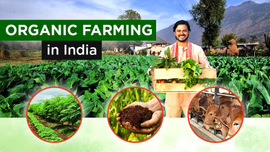An Ultimate Guide to Aquaponic Farming in India

Table of Contents
- Introduction
- Implementation of Aquaponics System in India
- Setting Up an Aquaponic System
- Advantages of Aquaponic Farming in India
- Issues and Troubleshooting
- Conclusion
Introduction
Aquaponic farming is a type of agriculture that emphasises sustainable practice. It involves farming soilless plants and raising fish in tanks. This creates a balanced system where the water used for the plants gets purified for the fish, and the water from the rearing of the fish acts as a natural fertiliser for the plants due to its nutrient-rich characteristics.
This system involves hydroponics farming and aquaculture and develops an environment of mutual benefit for fish and plants. Aquaponic farming can be done sustainably to grow vegetables and raise fish for a single household, locality or commercial purposes. We will discuss the different aspects associated with Aquaponics farming in India.
Implementation of Aquaponics System in India
Aquaponic farming is implemented in diverse ways, such as aligning with organic farming practices and eliminating synthetic fertilisers, herbicides or pesticide usage. It is also used in rooftop gardens where aquaponic vertical farming with rooftop gardens in urban spaces has allowed fresh vegetables and fish to grow within a controlled environment. Indian aquaponics is also an answer to the challenges in drought-prone areas, where water recycling within the controlled closed-loop system can help. This ideal solution in these regions minimises the need for water by combining hydroponic plantation and a fish-rearing system for sustainable and optimal growth of vegetation and fish.
Setting Up an Aquaponic System
Various crucial factors can be considered while setting up an aquaponic system. Some of these are
Accessibility Requirements
Factors like water accessibility, sunlight, and electricity accessibility must be considered before setting up an aquaponic system.
Plant and Fish Selection
Different types of fish in aquaponic are ornamental fish, bass, salmon, catfish, and tilapia. Various types of plants are spinach, lettuce, herbs, chives, mint and others. It is important to decide beforehand about the plants and fish to be included in aquaponic farming.
Infrastructure Requirements
The infrastructure or design of the aquaponic system varies according to the type of fish and plants. The size also varies based on the space available. The infrastructure also involves a water pump, fish tank, water filtration system, and plantation space.
Water Management
A proper water circulation, filtration and management system is crucial for successful aquaponic farming. Constant monitoring can help ensure appropriate water pH, temperature, nitrate and ammonia levels.
Feeding and Monitoring
Fish feeding is crucial in the aquaponic system, and the food should be high-quality with all the vital nutrients available for fish. Regular monitoring can help identify irregularities or diseases among the fish, which can be corrected on time.
Setting up an aquaponic system requires careful planning, research and implementation. Efficient management of diverse components within the system can offer a successful crop growth approach.
Advantages of Aquaponic Farming in India
Aquaponic farming is growing in popularity in India as one of the top sustainable practices in the agricultural industry. With the growing population, sustainable agricultural practices are in high demand, and aquaponic farming is among the practices needed to ensure food security. It offers several advantages over traditional farming:
Year-round cultivation
As the system can be significantly controlled, the growing condition can be simulated for optimal growth. This ensures year-round cultivation of crops and allows farmers to increase their income opportunities by overcoming the limitations related to seasonal agriculture.
High-Value Organic Crops
Aquaponics India allows the cultivation of crops like strawberries, herbs, exotic vegetables, and other high-value crops. These crops can easily fetch premium prices, and cultivation using an aquaponic vertical farming system can increase farmers' overall income and diversify their source of income.
Space Utilisation
This system can efficiently be designed vertically to increase space usage. This allows it to be easily implemented in urban areas with limited space.
Water Efficiency
It uses less than 20 per cent of the water than conventional farming. This is achieved by recirculating the water, thus reducing the overall consumption. It is beneficial for regions facing water challenges.
Improved Produce
It can produce around five times the plants in around half the time traditional farming takes.
Revenue Diversification
It offers multiple revenue sources by cultivating a diverse range of crops, including vegetables and fish.
Reduced environmental impact
This system helps reduce the negative environmental impact by reducing pollution in water and soil from chemical inputs. The greenhouse gas emission related to other traditional approaches is also not a part of this system, thus making it environmentally friendly.
Issues and Troubleshooting
Aquaponic farming in India has its own set of issues and troubleshooting measures discussed as follows:
Pest and Disease Management
Plants and fish are susceptible to pests and diseases, which can highly affect the system. Proper monitoring and hygiene practices can help efficiently manage pests and diseases.
Lack of Knowledge
This form of farming requires specific knowledge and expertise to address the challenges quickly and reduce their negative influence on the system. Participating with other aquaponic farmers, training programs, or workshops can help increase the knowledge.
Demand and Market Accessibility
The demand can fluctuate due to unforeseen factors, leading to a loss. Hence, before entering aquaponic farming, it is crucial to understand the market demand and develop and ease its accessibility. Developing networks and partnerships can help create demand and market accessibility.
Conclusion
Aquaponic farming in India offers a sustainable method of farming capable of dealing with several existing issues related to farming, such as land or water shortages. Its efficient water and land usage, along with year-round cultivation, employment opportunities, and income diversification, makes it an attractive form of farming. With proper research, training and knowledge, one can quickly get into aquaponics farming and promote a method that contributes towards environmental sustainability.
Frequently Asked Questions On An Ultimate Guide to Aquaponic Farming in India
1. What is Aquaponic farming?
Aquaponic farming is a type of agriculture that emphasises sustainable practice. It involves farming soilless plants and raising fish in tanks.
2. How to start aquaponic farming in India?
Careful selection of the location, plant and fish, infrastructure development, water management, feeding and monitoring are required to start aquaponic farming in India.
3. Is Aquaponic farming profitable?
Yes, aquaponic farming is profitable if managed efficiently.
4. What are the advantages of Aquaponic farming?
The advantages of aquaponic farming are year-round cultivation, high-value organic crops, space utilisation, water efficiency, improved produce, diversification, and reduced environmental impact.
5. Why Aquaponic farming is important?
It is important as it offers faster growth and increased crop production.


Related Blogs












